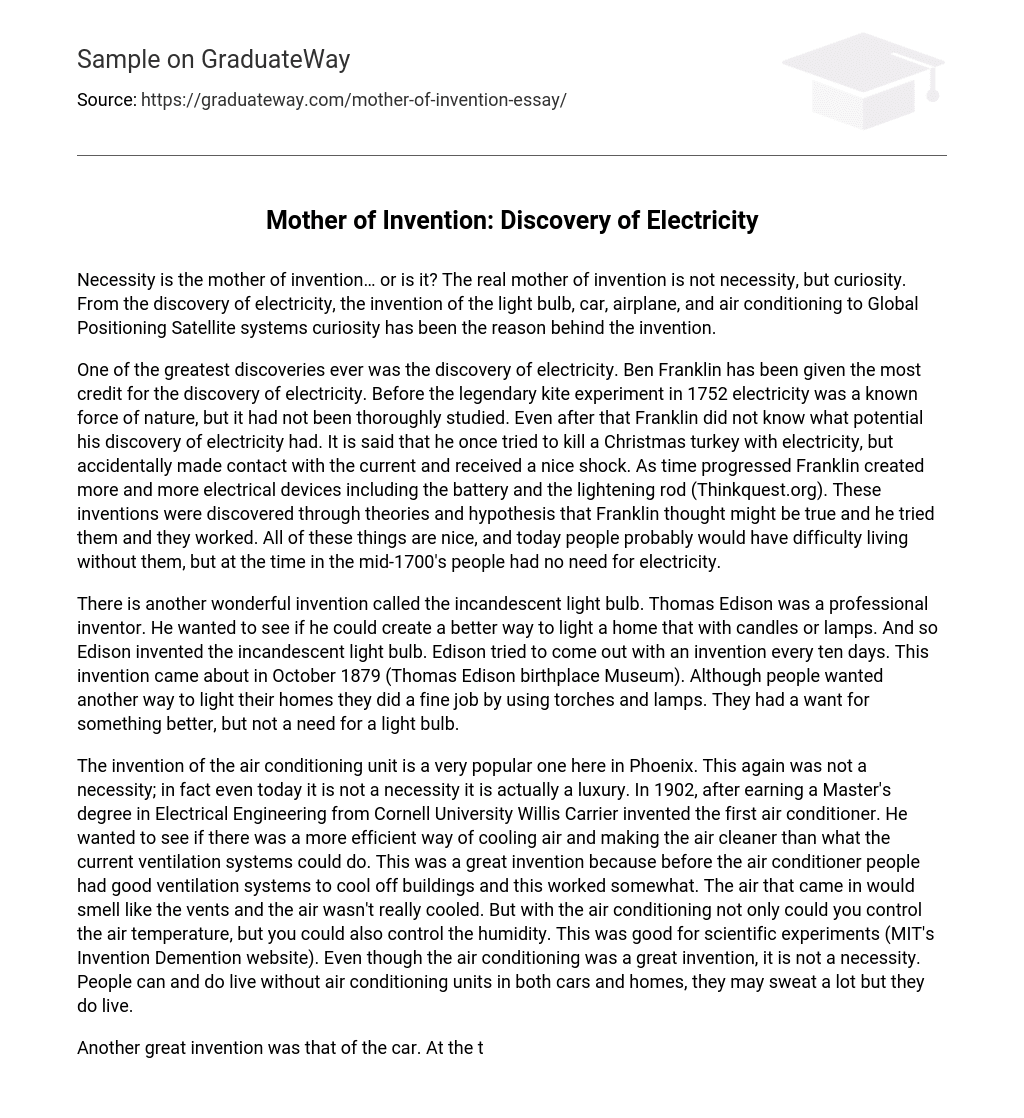Curiosity, not necessity, is the true driving force behind invention. It has sparked the creation of various inventions including electricity, light bulbs, cars, airplanes, air conditioning, and Global Positioning Satellite systems.
The discovery of electricity is considered one of the greatest in history, and Ben Franklin is widely credited for it. Prior to his famous kite experiment in 1752, electricity was recognized as a natural force but not extensively studied. Despite this experiment, Franklin himself did not fully grasp the potential of his finding. There is an anecdote that recounts his accidental self-shock while attempting to use electricity to kill a Christmas turkey. However, over time, Franklin developed various electrical devices such as batteries and lightning rods based on his proven theories and hypotheses. These inventions have now become indispensable in modern life; however, during the mid-1700s, people had no practical application for electricity.
There is another remarkable invention known as the incandescent light bulb which was created by professional inventor Thomas Edison. Edison’s goal was to find a superior method of lighting homes compared to candles or lamps. In October 1879, Edison successfully invented the incandescent light bulb. Despite people’s desire for an alternative way to illuminate their homes, they managed adequately with torches and lamps. While there was a want for something better, there was no actual need for a light bulb.
The invention of the air conditioning unit in Phoenix is highly popular. Despite being a luxury, it was created in 1902 by Willis Carrier, a Cornell University Electrical Engineering Master’s degree holder, to explore better ways of cooling and purifying air than the existing ventilation systems. This invention greatly improved upon the previous ventilation systems, which only provided limited cooling and had a tendency to emit odorous air. Additionally, air conditioning offered the ability to control both air temperature and humidity, making it valuable for scientific experiments. While not a necessity, people can, and do, live without air conditioning units in cars and homes, though they may experience excessive sweating.
Prior to the invention of cars, people relied on horses and carriages or walked for transportation. This was the widely accepted means of getting around. In 1896, Henry Ford introduced his first automobile as a faster mode of travel. He then established the Ford Motor Company in 1903, which revolutionized transportation with assembly lines and affordable cars. The Model T became well-known and cost approximately $200, making it accessible to many individuals. Interestingly, Ford paid his workers an unprecedented wage of $5 a day, empowering them to purchase the cars they were assembling (National Inventors Hall of Fame website). While I personally value my own car and acknowledge its significance in numerous lives today, during that time period people either walked or used horses to reach their destinations; thus owning a car was far from being necessary.The Wright brothers revolutionized human flight in 1903 with their invention of the airplane. Before this, they had created gliders and other flying devices, but it was not until 1903 that they achieved their first successful flight. As a result, the remarkable flying machine was granted a patent in 1906 (Thinkquest.org).
Today, air travel has transformed transportation between Phoenix and Los Angeles, allowing individuals to complete the journey within hours instead of spending six or seven hours by car or even longer on horseback or foot. Although air travel is often seen as a luxury rather than a necessity, people can still live fulfilling and healthy lives without ever stepping onto an airplane.
Created by the U.S. Department of Defense in 1995, the Global Positioning Satellite (GPS) system was designed to enhance navigational technology. By receiving RF signals from a GPS satellite, it provides accurate direction readings similar to a compass, regardless of movement. While not essential, individuals can still live without owning one of these devices (AskJeeves.com).
Although inventions such as electricity, light bulbs, air conditioning, automobiles, airplanes, and GPS systems may appear necessary now, they were not considered necessities when they were first created. These inventions were sparked by curiosity and the question of “I wonder if…”. Hence, invention is not driven by necessity; rather, it is driven by curiosity.
Bibliography
Thinkquest.org website,
Thomas Edison birthplace Museum website,
MIT’s Invention Demention website,
National Inventors Hall of Fame website
and
Thinkquest.org website.
Also, you can visit
Ask Jeeves.





